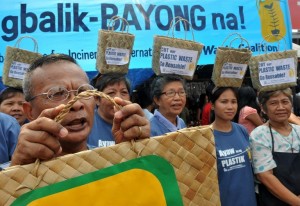
Environmental activists carry bags made of palm leaves as they visit a Manila market to support a proposed ban on plastic grocery bags in this file photo. The Philippine plastics industry, which is reeling from local government restrictions on the use plastic bags, is getting a much-needed shot in the arm from Japanese investors, according to the Department of Trade and Industry. AFP PHOTO / JAY DIRECTO
MANILA, Philippines—The Philippine plastics industry, which is reeling from local government restrictions on the use plastic bags, is getting a much-needed shot in the arm from Japanese investors, according to the Department of Trade and Industry (DTI).
Citing presentations at the recent technical consultation on the Philippine-Japan Economic Partnership Agreement (Pjepa), DTI said new Japanese investors need raw materials for their packaging needs.
They may also explore other product lines that Philippine plastics suppliers can provide under Pjepa.
“The prospects for business for the plastics manufacturers and packaging materials suppliers are looking up,” said Vicente Co, vice president for sales and marketing for Manly Plastics, a member of the Philippine Plastics Industry Association (PPIA).
Plastics firms currently supply to automotive companies like Toyota and can diversify their product mix if given preferential tariffs, Co said.
The PPIA and 13 other industry groups said Friday that there would be some negative impact from local governments’ moves to regulate plastic use, such as in the case of Quezon City, where consumers must use reusable bags or brown bags provided by retail outlets; otherwise, they must pay P2 per plastic bag.
PPIA spokesperson Crispian Lao said the restriction would negatively impact the plastic bags subsector, which employs 175,000 out of the 650,000 workers living off the total industry.
However, other segments of the plastics industry, such as the recycling subsector, still have room for growth, Lao said.
DTI reported that preliminary studies on the country’s first bilateral free trade agreement (FTA) showed increased Japanese investments into the Philippines after the Pjepa took effect in December 2008.
Japan was the top source of foreign capital pledges in 2011 with P77.34 billion, or 30.2-percent share, ahead of the United States (27.5 percent) and the Netherlands (11.1 percent), according to data from the National Statistics Coordination Board.
Approved Japanese investments in the Philippines reached P58 billion in 2010 and P70.737 billion in 2009, much more than the P38 billion investments approved in 2007 before the agreement took effect.
Nomura Research Institute of Japan reported big-ticket investments entering or expanding in the Philippines starting 2011, amounting to $1.049 billion.
Some of these investors include printer companies like Canon, Brother and Epson.
The technical consultation for Pjepa organized by the DTI is part of the program to enable stakeholders to participate in trade policy formulation and trade negotiations.
Under Article 161 of Pjepa, a general review of the agreement is scheduled every five years, starting in 2011.
Pjepa consultations with the private sector, academe and civil society were launched in mid-2011 and sub-committees are reviewing the FTA.
Two more plenary Pjepa consultations are scheduled in Cebu (October 10) and Davao (October 24).
Impact assessment studies on Pjepa will be presented on those dates. The DTI said that it will be accepting position papers from the industry as part of the consultation process.
DTI Undersecretary Adrian S. Cristobal Jr. said there needs to be an efficient and effective consultation mechanism.
“Trade policy formulation must be more consultative and effective to make sure policy makers and negotiators do not merely rely on econometric models to arrive at policy or negotiating positions,” Cristobal said.